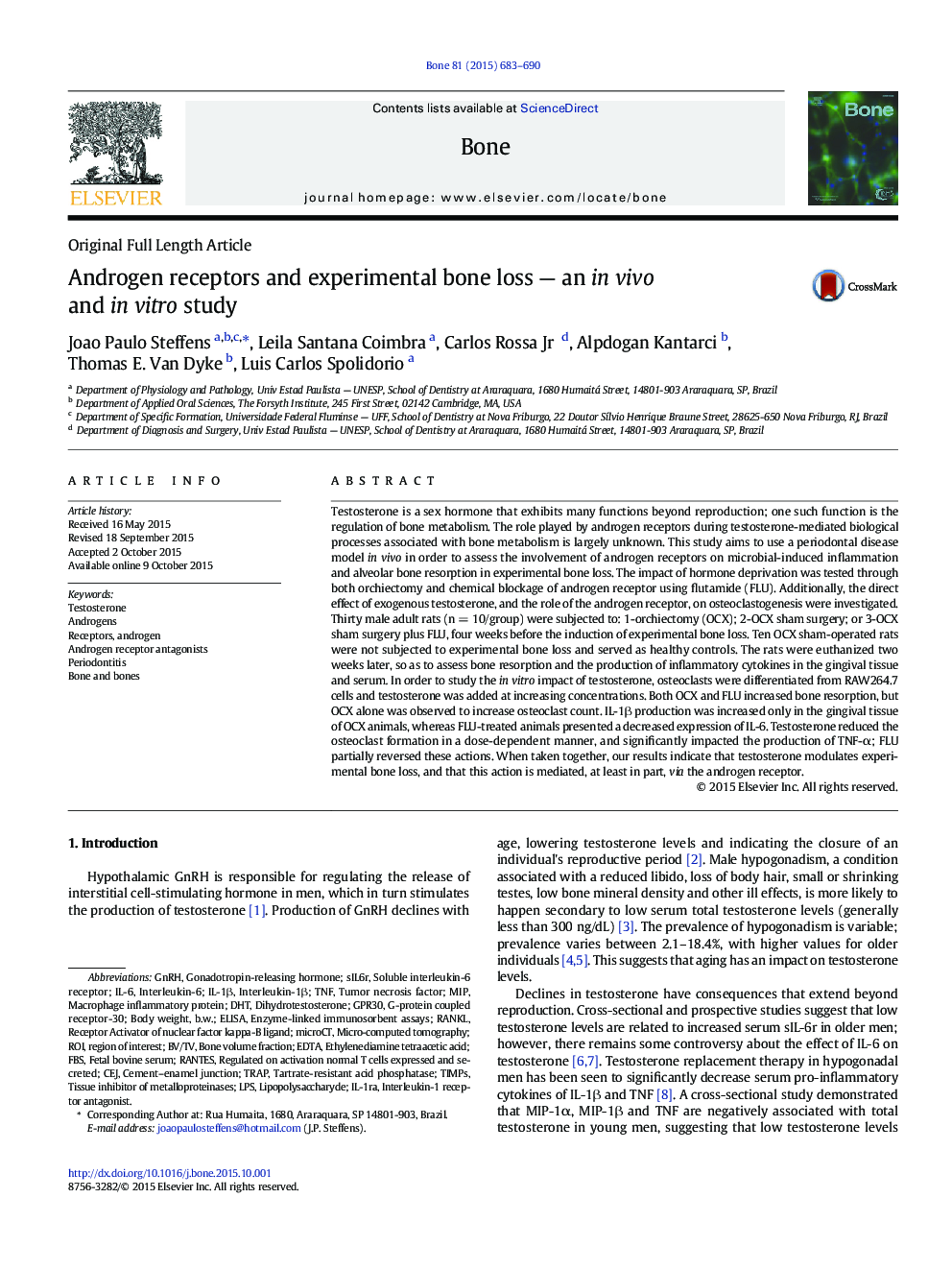| کد مقاله | کد نشریه | سال انتشار | مقاله انگلیسی | نسخه تمام متن |
|---|---|---|---|---|
| 5889370 | 1568138 | 2015 | 8 صفحه PDF | دانلود رایگان |
عنوان انگلیسی مقاله ISI
Androgen receptors and experimental bone loss - an in vivo and in vitro study
دانلود مقاله + سفارش ترجمه
دانلود مقاله ISI انگلیسی
رایگان برای ایرانیان
کلمات کلیدی
DHTIL-1RAIL-1βTRAPmicroCTb.w.RANKLGPR30ROIMIPTIMPsFBSIL-6LPSTNFGnRHBV/TV - BV / TVAndrogen receptor antagonists - آنتاگونیست گیرنده آندروژنinterleukin-1 receptor antagonist - آنتاگونیست گیرنده اینترلوکین-1androgens - آندروژنenzyme-linked immunosorbent assays - آنزیم های وابسته به ایمنی جذب شدهEDTA - اتیلن دی آمین تترا استیک اسید Bone and bones - استخوان و استخوانethylenediamine tetraacetic acid - اسید اتیلنیدین تتراستیکtartrate-resistant acid phosphatase - اسید فسفاتاز مقاوم در برابر تارتاتinterleukin-6 - اینترلوکین ۶Interleukin-1β - اینترلوکین-1βCEJ - بیشترELISA - تست الیزاtestosterone - تستوسترونMicro-computed tomography - توموگرافی کامپیوتری میکروDihydrotestosterone - دی هیدروتستوسترونfetal bovine serum - سرم جنین گاوtumor necrosis factor - فاکتور نکروز تومورRANTES - مطالبregion of interest - منطقه مورد نظرTissue inhibitor of metalloproteinases - مهار کننده های متالوپروتئینازهای بافتGonadotropin-releasing hormone - هورمون آزاد کننده گنادوتروپینbody weight - وزن بدنmacrophage inflammatory protein - پروتئین التهابی ماکروفاژPeriodontitis - پریودنتیتBone volume fraction - کسر حجم استخوانSoluble interleukin-6 receptor - گیرنده اینترلوکین 6 قابل حل استReceptors, androgen - گیرنده ها، آندروژنreceptor activator of nuclear factor kappa-B ligand - گیرنده گیرنده لیگاند کاپا-B فاکتور هسته ای
موضوعات مرتبط
علوم زیستی و بیوفناوری
بیوشیمی، ژنتیک و زیست شناسی مولکولی
زیست شناسی تکاملی
پیش نمایش صفحه اول مقاله

چکیده انگلیسی
Testosterone is a sex hormone that exhibits many functions beyond reproduction; one such function is the regulation of bone metabolism. The role played by androgen receptors during testosterone-mediated biological processes associated with bone metabolism is largely unknown. This study aims to use a periodontal disease model in vivo in order to assess the involvement of androgen receptors on microbial-induced inflammation and alveolar bone resorption in experimental bone loss. The impact of hormone deprivation was tested through both orchiectomy and chemical blockage of androgen receptor using flutamide (FLU). Additionally, the direct effect of exogenous testosterone, and the role of the androgen receptor, on osteoclastogenesis were investigated. Thirty male adult rats (n = 10/group) were subjected to: 1-orchiectomy (OCX); 2-OCX sham surgery; or 3-OCX sham surgery plus FLU, four weeks before the induction of experimental bone loss. Ten OCX sham-operated rats were not subjected to experimental bone loss and served as healthy controls. The rats were euthanized two weeks later, so as to assess bone resorption and the production of inflammatory cytokines in the gingival tissue and serum. In order to study the in vitro impact of testosterone, osteoclasts were differentiated from RAW264.7 cells and testosterone was added at increasing concentrations. Both OCX and FLU increased bone resorption, but OCX alone was observed to increase osteoclast count. IL-1β production was increased only in the gingival tissue of OCX animals, whereas FLU-treated animals presented a decreased expression of IL-6. Testosterone reduced the osteoclast formation in a dose-dependent manner, and significantly impacted the production of TNF-α; FLU partially reversed these actions. When taken together, our results indicate that testosterone modulates experimental bone loss, and that this action is mediated, at least in part, via the androgen receptor.
ناشر
Database: Elsevier - ScienceDirect (ساینس دایرکت)
Journal: Bone - Volume 81, December 2015, Pages 683-690
Journal: Bone - Volume 81, December 2015, Pages 683-690
نویسندگان
Joao Paulo Steffens, Leila Santana Coimbra, Carlos Jr, Alpdogan Kantarci, Thomas E. Van Dyke, Luis Carlos Spolidorio,